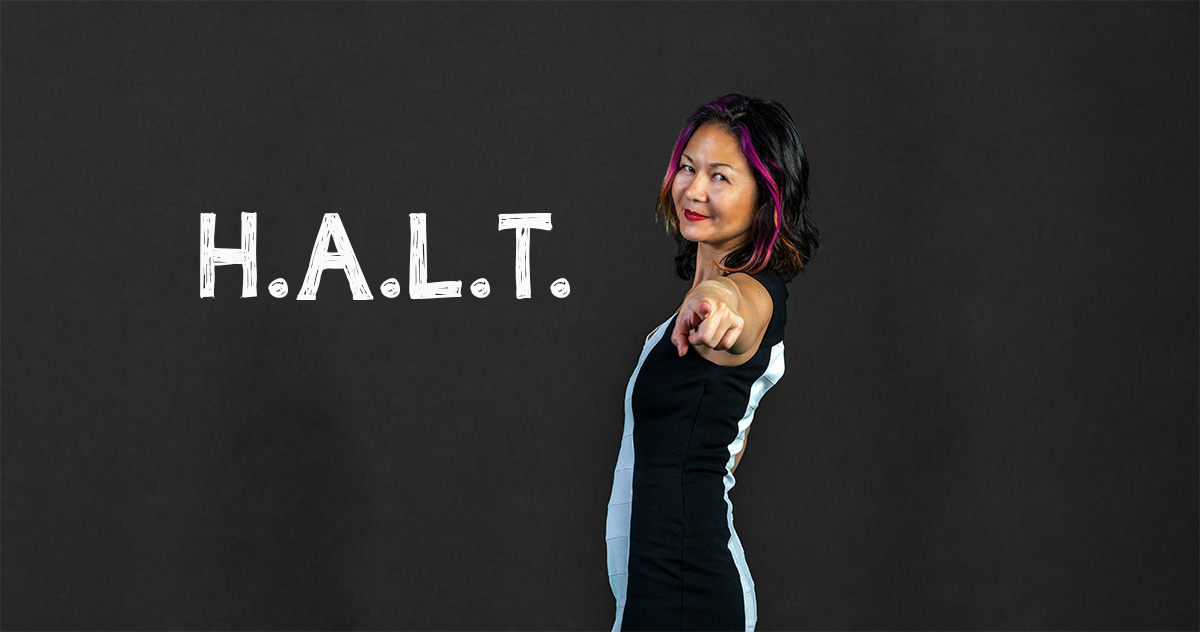Hungry, Angry, Lonely, Tired — HALT

Hungry, Angry, Lonely, Tired — HALT
Luckygirliegirl .
HALT is an acronym first developed for people with an addiction who were in recovery, to help them identify when they are most vulnerable to relapsing.
Hungry, Angry, Lonely, Tired — HALT — is what I have adopted to shift my behavior from emotional and reactionary to more thoughtful and positive. By focusing on deliberate patience, kindness, gratitude, and empathy I have seen a profound difference in how I operate, inviting my best self to show up more often than before. It has made a huge difference in every aspect of my life.
Having a strong emotional resilience skills comes from practice, forcing yourself to take a beat before acting. Here are some situations where your judgment is in danger of getting clouded and it would be wise to push pause before reacting:
- Anger or Frustration: When we are feeling angry or frustrated, our decision-making can be impulsive and reactive. It’s essential to take a step back, calm down, and allow emotions to subside before making significant choices.
- Overwhelm or Stress: High levels of stress or feeling overwhelmed can impair our ability to think clearly and consider all aspects of a decision. In such cases, it’s beneficial to take a break, engage in stress-reducing activities, or seek support before proceeding.
- Fear or Anxiety: Fear and anxiety can lead to avoidance or overly cautious decision-making. While some caution may be necessary, making decisions solely based on fear can prevent us from taking necessary risks or seizing opportunities.
- Sadness or Grief: When we are experiencing sadness or grief, we may not be in the right emotional state to make important choices objectively. Grieving individuals may need time and support to process their emotions before making significant life decisions.
- Extreme Happiness or Elation: While happiness is generally positive, extreme joy or elation can lead to overconfidence and overlooking potential risks. It’s crucial to maintain a balanced perspective when making decisions, even during positive times.
- Under the Influence of Substances: Alcohol or drug use can impair judgment and lead to poor decision-making. Avoid making important decisions while under the influence, as it can have long-term consequences.
- Conflict or Tense Relationships: Making decisions in the midst of unresolved conflicts or tense relationships can be challenging. Emotions may influence our choices, and it’s often best to address the conflicts first before proceeding with decisions.
- Exhaustion or Sleep Deprivation: Lack of proper rest and exhaustion can diminish cognitive abilities and lead to suboptimal decision-making. Ensure you are well-rested and alert before tackling important choices.
So what can we do?
Give yourself a bit of a cushion. Make some space. Create separation between the emotion of the moment and yourself. This may be literal like taking a walk or it might be simply breathing and meditating. You may find clarity and calm comes from listening to music, exercising, drinking some water, or simply giving yourself a time out before moving forward. Whatever gives you the best chance to pause and reset is what you should use to your benefit.
You also might consider co-opting people to help — consulting with trusted friends and allies who will tell you the truth and seeking professional counseling from a quality mental health professional who can help you identify your patterns, triggers, and coping mechanisms.
Intuitively, we know that acting based on a rising emotion — anger, fear, embarrassment, shame, guilt, insecurity, etc. — is unlikely to yield positive results. Training ourselves to push that pause button and evaluate the situation from a rational, logical, and reasonable mindset ensures we get the best results from ourselves and others.
All of this may sound obvious but I know I’m not the only one who struggles with this. You might have a trauma-informed brain like I do. For many people, the trauma we carry inside us dictates how we navigate the world around us. There is no shame in struggling but once we recognize its negative impact we should do what we can to make incremental changes to the way we behave, for our sake and those we interact with.
I am a Mental Health First Aid trainer, mentor, author, and brand strategy consultant who has been lucky enough to have spoken on all 7 continents. I wasn’t raised with the emotional intelligence to overcome life’s challenges, life’s lessons gave me the tools to persevere. If you are looking for different results in your life, and you’d like to learn how to create your own luck by cultivating more emotional resilience skills, then check out my book: “Mastering Resilience: Lessons Learned on the Path to Emotional Strength” on Amazon and Kindle. And join my mentees and coaching clients in creating you best life yet!
Share this:
Related
all categories
- 1 Luckygirliegirl Podcast55
- Community80
- Digital Strategy7
- Emotional Intelligence38
- Emotional Resilience8
- Entrepreneurship121
- Guest Blogger17
- Imposter1
- Lifestyle44
- Luckygirl Podcast Episodes119
- marketing11
- Mentorship25
- MHFA6
- News7
- podcasting13
- Random Musings29
- Speaker107
- The Avery Burton Foundation4
- The FierceWomen Project2
- Training8
- Transformation52
- Uncategorized7
- Women in Business123
- Women in Tech75
Tags
- Christina Aldan
- Women in Business
- Entrepreneur
- Speaker
- Personal Growth and Development
- Women in Tech
- Emotional Intelligence
- Solopreneur
- podcast
- Leadership
- Entrepreninja
- LG Podcast Network
- self-awareness
- Life Coach
- Social Media Marketing
- Downtown Las Vegas
- Diversity and Inclusion
- mentorship
- conferences
- dtlv
